Latest About Google:
Yesterday, the SEO community noticed large fluctuations and changes in the Google search results. In addition, many of the automated Google tracking tools, such asMozcast all suggested a major Google algorithm update has touched down.
We asked Google about this and the company told us that, “as usual,” it is “continuing to make tweaks” to the search results but at this time, it has no “specific “update” to announce.” Google also confirmed that whatever the community and the tools spotted, it was unrelated to the Google Panda Update or the Google Penguin update.
Some suspected it might be related to the mass mobile warnings being sent out earlier in January about non-mobile-friendly websites. But based on my research, whatever happened yesterday was unrelated to mobile-specific sites.
It is unclear right now what this “tweak” was, if anything. But Google has said, again, it was not related to Penguin or Panda. Link Source
Latest about BING:
That’s what it looks like if you do a search for “super bowl” on Bing. (You can click the image to see a bigger version if it helps. I’ll be commenting on the numbered items above throughout the article below.)
I know, as a longtime SEO consultant, that I’m supposed to hate all of the content on the page and how far down the “10 blue links” have been pushed and how much traffic sports-related websites are probably losing because there’s so much content and so little need to click to another page … but I think this is the single greatest page of search results I’ve ever seen on Bing. Here’s why:
Left-Side Content
The top of the main search results content block starts with basic game info (#1 on the image above) that, by now, we’d all expect on any search engine. Indeed, Google and Yahoo have very similar boxes.
Bing’s answer box goes way beyond Google and Yahoo, though. It’s got a game prediction from the often correct Bing predictions tool that adds some color to the game matchup. (#2 above) Oh, and there’s an affiliate link for “Tickets” that leads to SeatGeek.com. I can do without that, but whatever.
Then there’s data from Stats LLC showing some of the key players (#3 above) in Sunday’s game, including projections on two “game changers” — Rob Gronkowski and Marshawn Lynch — and season leaders from both the Patriots and Seahawks.

It’s fantastic.
Below that, the left side of the page finally gets into the news links (#4 above), website links and more — including a block of videos for Super Bowl commercials, even though I didn’t specifically search for commercials. Smart move, in my opinion, because those commercials are one of the main reasons a lot of people watch the game in the first place.
Right-Side Content
Bing’s search results page gets even more interesting over on the right side of the page.
It starts with a big block of data (#5 above) from the Bing Snapshot product. In this case, Bing’s telling us how to watch the game — including a link to NBC’s free, online stream. (Google Trends tells us that searches for “super bowl live stream” are way up at the moment.) Bing even tells us who’s singing the national anthem and at halftime. Great touches.
A little farther down the Snapshot content is a series of four factoids about each team (#6 above). It’s got a quote from each team, an “X factor” player, a “Question mark” and a “How they’ll beat” the other team statement.
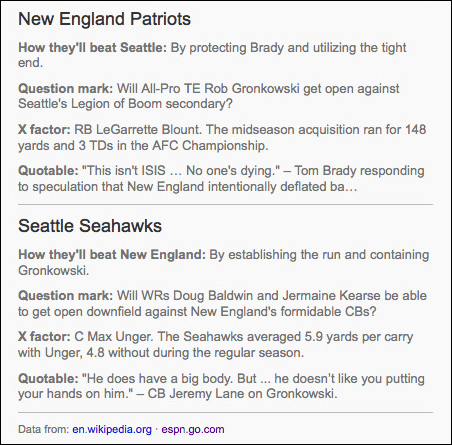
Here’s what’s interesting about this: Someone at Bing has written this content specifically for the search results page. I’ve asked Bing to tell more about this, but they haven’t answered yet. But I know this: Do searches for the exact phrases in this section — like “Will All-Pro TE Rob Gronkowski get open against Seattle’s Legion of Boom secondary?” — and you won’t find them anywhere else on the web in that exact wording. Bing credits the Snapshot data to Wikipedia and ESPN, but neither have the exact phrase “Will WRs Doug Baldwin and Jermaine Kearse be able to get open downfield against New England’s formidable CBs?” That’s original text on Bing’s part.
After that, the right side has things like related searches, related images, a couple ads and it ends with a recent Super Bowl-related tweet (#7 above).
What About Google?
Google’s search results page for the same query this morning is nothing like Bing’s. It’s kind of shocking that such a popular cultural event only gets a basic Onebox treatment on Google, followed by the standard news and website links.

Google isn’t even showing video or image results for this query. LINK SOURCE
Latest at YAHOO:
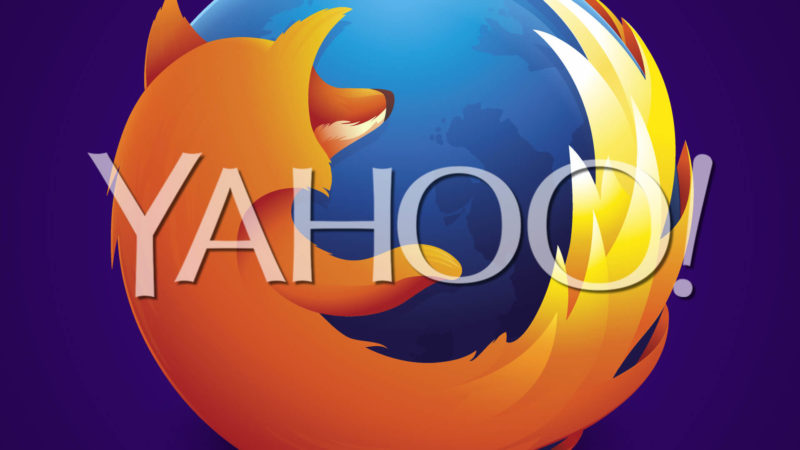
According to StatCounter, Yahoo made further US search market-share gains in January. The web measurement firm said that Yahoo had 10.9 percent of the search market, “its highest US search share for over five years.”
This follows an initial gain from November to December, according to StatCounter, after the announcement of Yahoo’s default search deal with Firefox. In November StatCounter said Yahoo had a US market share in search of 8.6 percent.
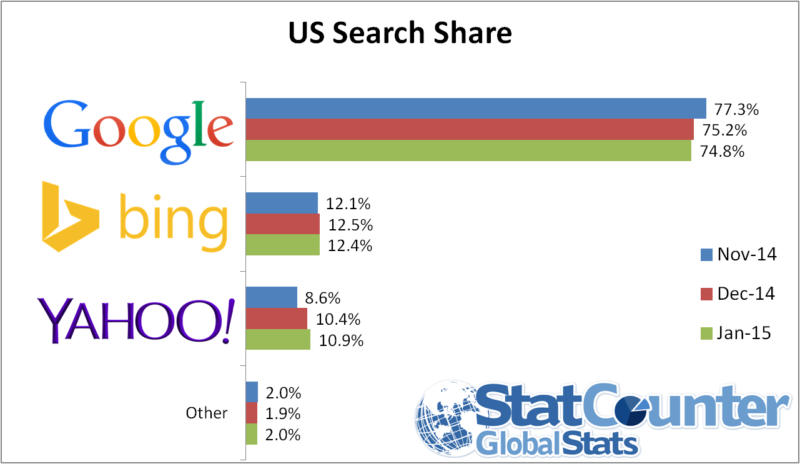
StatCounter explained that this was the first time, since the company began reporting traffic data, that Google had dipped below 75 percent in the US.
Two weeks ago comScore reported an even stronger gain for Yahoo, saying the company’s share of the US search market jumped from 10.2 percent to 11.8 percent, a significant bump of 1.6 percentage points.
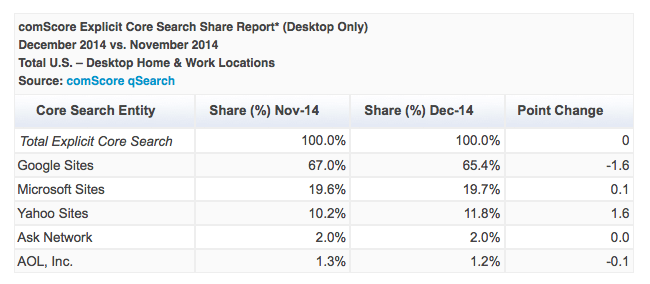
StatCounter says, conclusively, that the Firefox deal is responsible for Yahoo’s recent movement. When it separated out Firefox users, Yahoo’s share is actually flat or down slightly vs. last month.
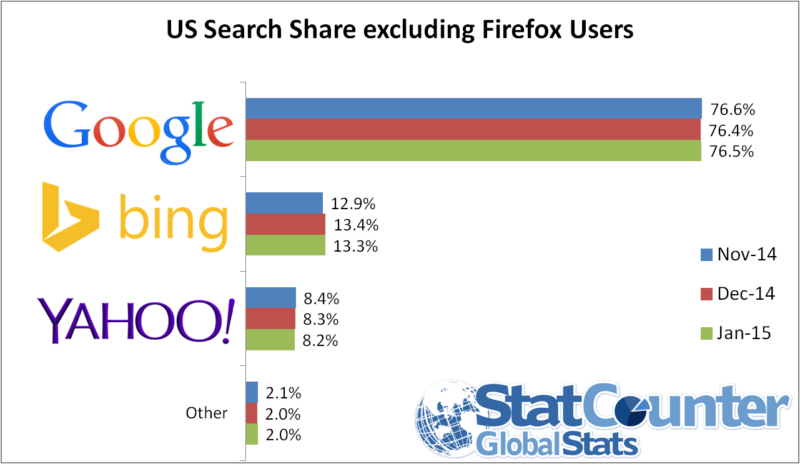
Firefox generates approximately 14 percent of internet traffic in the US says StatCounter. Were the browser’s share greater it would mean an even larger gain for Yahoo.
Responding to the shift, in late January Google started to ask Firefox users to switch back or switch to Google. Some Firefox users saw prompts such as “make Google your homepage” and “make Google your default search engine.” It’s not clear how successful this has been in bringing users back.
RKG’s Mark Ballard cited evidence to argue that many Firefox 34 users are switching back to Google as their default search engine. He points out, however, that Safari is a much bigger prize. It’s unlikely that will go to Yahoo.
Responding directly to that “switchback” claim, StatCounter said it’s not happening. StatCounter CEO Aodhan Cullen posted, “Some analysts expected Yahoo to fall in January as a result of Firefox users switching back to Google. In fact Yahoo has increased US search share by half a percentage point.” LINK SOURCE




